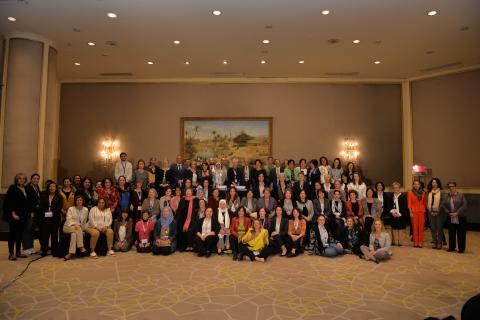Declaration of the Euro-Med Women’s Rights Civil Society Conference
 |
| EFI-IFE 28 Nov 2017 |
Since the first Ministerial Conference in Istanbul 2006, the UfM Ministerial Process on strengthening the role of women in society has been approached by civil society as one of the major tools to promote gender equality in the Euro-Med region. Following up on the Ministerial Conclusions, Euromed Feminist Initiative launched in 2015 a women’s rights CSOs-led dialogue process between civil society and decision makers with the support of the European Union. The outcome is a Gender Regional Platform, developed by over 600 participants. The Civil Society Conference held on November 22nd -23rd, 2017 in Cairo has been the final step in this process, before the 4th Ministerial Conference.
The Civil Society Conference gathered over 130 representatives from 107 organizations and networks, as well as academia and media from 26 countries. Participants shared expertise and analyses of the situation in the region, exchanged experiences from the ground, and based on the priorities and policy orientations of the Gender Regional Platform, produced recommendations for concrete policy measures, possible to be implemented by the governments before the 5thUfM Ministerial Conference.
Participants reaffirmed that the status of gender equality is a measure of democracy and development, and cannot be dissociated from the wider political, social, cultural and economic trends. They expressed a unanimous concern about the global regression of women’s rights and the shrinking space and means for the action of the civil society as a whole, which contributes to limiting the action and influence of the women’s rights organizations in particular. Furthermore, the turbulent developments and the resort to militarized solutions to the conflicts in the region are often used by governments as excuses to postpone the adoption of measures and policies leading to strengthened women’s rights.
In this context, participants emphasized that priority must be given to sustainable gender equality policies to face the global wave of social conservatism, religious extremism, nationalism and populism, and to favor democracy and development in the Euro-Med region as well as political solutions to all conflicts. This is all the more so, since the rise of violent extremism has led to increased threats to women’s lives. It must thus be treated as a security issue integral to the Women, Peace and Security Agenda.
Participants thus urged Ministers to make the 4th Ministerial Conference a turning point, and take concrete and tangible measures towards improving the status of gender equality in the whole region. They also urged governments to allocate the necessary human, material and financial resources to all reforms, to ensure their implementation.
They reaffirmed the role of the Gender Regional Platform as a mobiliser of both local and national women’s rights organizations in Euro-Med and a key in furthering the dialogue with policy makers, hence bringing the grassroots demands to policy level.
The Civil Society Conference recommends therefore the following concrete policies in the areas of:
I. Women’s participation in public life and decision-making
In spite of the different national contexts, all States face common pattern of exclusion of women in decision-making: even though political parties appeal to democracy and citizenship, they de facto have not included women, women’s rights and gender equality in their political agendas. Developing a comprehensive gender equality legal framework in each country, taking the examples of the most advanced in this regard, and ensuring the independence of the women’s movement to support its implementation, are crucial means to ensure women’s meaningful participation.
Adopt proportional electoral systems, combined with binding gender quotas of a minimum 40% presence of either sex in electoral lists and governance bodies in order to overcome deficiencies in democracy. Establish follow-up mechanism on non-compliance through significant sanctions, including disqualifying non-complying lists.
Adopt comprehensive gender equality laws to address gender inequalities at all levels (wage inequality, unequal access to resources, gender based violence, stereotypical media portrayal of women), accompanied with means for their implementation to ensure and safeguard women’s rights from regressive measures. Such a legal development would have a strong symbolic value and should be a point of departure for the implementation of basic human women’s rights, enabling tangible change.
Ensure that legislation and public policies give special consideration to the situation of vulnerable women who, for reasons of age, disability or their belonging to some minority group, might suffer intersectional discrimination.
Adopt NGOs legislation ensuring freedom of expression and movement; ensure sufficient funding to women’s rights organizations on both side of the Mediterranean, to enable their independence and capacity of action so that they can play their leading role in reshaping society and contribute to the fight against extremisms.
II. Women’s economic participation
A real change in the field of economic participation requires structural transformation of the economic system, based on the need of human development, and not on the profit of a minority. States should assume their responsibility in this field and develop economic policies that benefit women and men equally. To this end, they must structurally address both the private sphere of reproduction and the public sphere of production.
Adopt legislation and provide public services and infrastructures aimed at allowing women’s access to, and participation in, the labor market in equal conditions with men, accompanied by control procedures, mandatory equality plans for companies and substantial non-compliance sanctions.
Provide a non-transferable, publicly funded parental leave for working fathers as well as for working mothers. Engage in policy making that ensures shared parental responsibility beyond parental leaves, using best experiences.
Engage in policy making towards equal pay for work of equal value and equal access to career opportunities and responsibilities. Provide control mechanisms and sanctions for employers that incur salary discrimination of women, both direct and indirect.
Provide permanent and structural access to information on women’s socio-economic rights.


